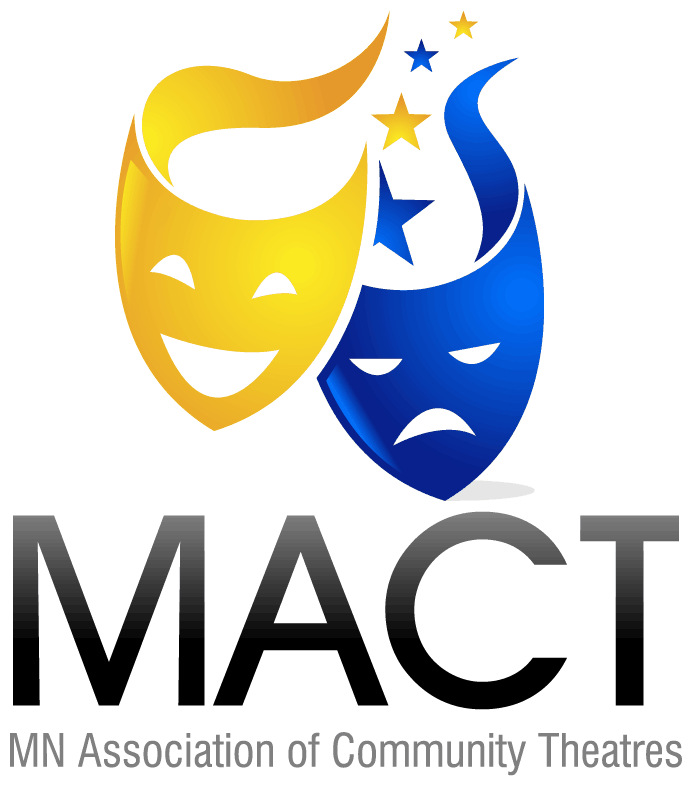MACT received a grant from the Metropolitan Regional Arts Council (MRAC) to present 2 sessions of audio describer training and 3 days of theatre workshops in the 7-county metro area. We are working on organizing these events right now.
This winter and spring, MACT will offer several trainings and workshops to help theatres and individuals become more accessible to patrons with disabilities.
MACT will offer these opportunities in the Twin Cities, thanks to a grant from the Metropolitan Regional Arts Council. They are open to anyone, and fees will be very modest:
- Two trainings of Audio Describers
- One training of Captioners
- Several workshops looking at other disability-related workshops.
Audio Describer Trainings
Audio Description (AD) is a service that describes visual aspects of events — live, filmed, virtual — to make the experience richer for persons who are blind or of low vision. Using descriptive, concise phrases, the describer visually captures costumes, sets, props, actions, facial expressions, and whatever the sighted audience may be seeing. From a booth or at the rear or side of an auditorium, the describer uses a headset microphone or steno mask to transmit to patrons who wear earbuds connected to FM receivers.
An audio describer typically contracts with a theatre, for instance, to audio describe one or more upcoming performances of a show. The theatre provides a script and opportunity to see the show in advance of the actual public description date, which they publicize on their website and in their news releases. This allows the describer to become familiar with the script and make notes about priority items to describe during the show. At the event, the describer presents pre-show notes about the stage and what is in the playbill, and during the show describes the visual action without talking over dialogue or bothering other patrons. For example, if you’re describing Macbeth, you must be able to describe what the witches are wearing, their facial expressions and the way they move around the space.
Often the describer will meet patrons afterward to get feedback.
Audio describer candidates should have a good voice, concise and quick command of language and adjectives, attention to detail, pronunciation, enunciation, punctuality and a commitment to enable patrons without sight to increase their appreciation of plays, dance, films, video, art exhibits or other events.
A nationally recognized AD trainer will offer two two-day trainings in the concepts, techniques and practice of AD. While these trainings are primarily focused on live description of performance events, trainees will learn the skills to earn money describing a variety of gigs — plays, conferences, videos, parades, cruises, exhibits or other outings. They will be encouraged to practice their new skills at actual events with blind patrons or other describer trainees to share feedback and hone their craft.
Some theatres may choose to invest in covering the modest costs of training volunteers or staff to audio describe future shows. (Theatres that have benefitted from doing this include Theatre in the Round in Minneapolis, Theatre B in Moorhead, and Commonweal Theatre in Lanesboro.) Venues can purchase their own audio description equipment (often with grant support) or borrow portable units from the Guthrie Theater.
While there is currently no certification for audio describers (as there isn’t for theatrical American Sign Language interpreters), MACT’s trainer, Celia Hughes of Art Spark Texas, serves on a national committee that is updating audio description standards and considering future certification.
Captioner Training
Captioning takes a play script, for instance, and edits it to what actors or speakers are saying for display on an LED screen or other device for patrons who are Deaf or hard of hearing. Local theatres use a variety of methods to provide scripted captions for their shows (as opposed to CART captioning provided by professionals who caption every word they hear, including missed cues, post-show discussions and other non-planned remarks). MACT’s training in the spring will look at the options currently available, including free software that does require getting used to….
Other Theatre Workshops
Other workshops, will be offered later this winter and in the spring. These will include a variety of theatre topics for actors, technicians and board members. Specific accessibility-related workshops may include Sensory Friendly Theatre, Diversifying Your Cast & Board, and The Penguin Project. Three Saturdays will be devoted to two topics to choose from each morning and two each afternoon, with an opportunity to network with other theatre people in between. Watch MACT’s website and our weekly newsletter for more information on dates and locations. (If you have a topic, venue or presenter to suggest, bring it on!)
More Information & Registration
These opportunities are provided by the Minnesota Association of Community Theatres, thanks to a grant from the Metro Regional Arts Council. A modest fee will be charged to cover materials. To receive details about the trainings, go to https://mn-act.net/, or email mactfactor@icloud.com or webmastermact@gmail.com, or call 612-819-0949.
 MACT
MACT